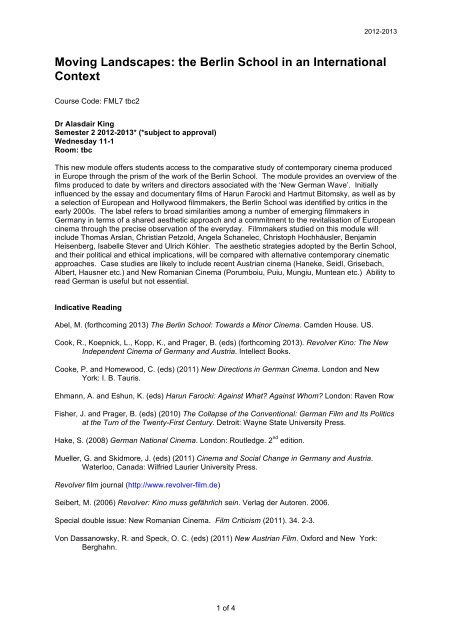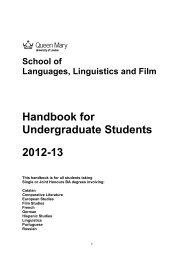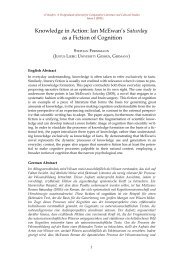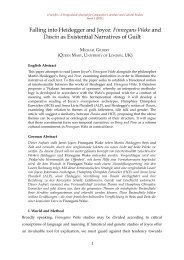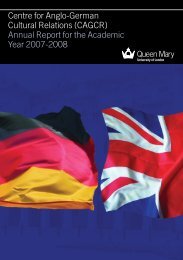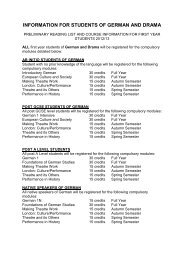Moving Landscapes (AJK) - School of Languages, Linguistics and Film
Moving Landscapes (AJK) - School of Languages, Linguistics and Film
Moving Landscapes (AJK) - School of Languages, Linguistics and Film
You also want an ePaper? Increase the reach of your titles
YUMPU automatically turns print PDFs into web optimized ePapers that Google loves.
1 <strong>of</strong> 4<br />
2012-2013<br />
<strong>Moving</strong> <strong>L<strong>and</strong>scapes</strong>: the Berlin <strong>School</strong> in an International<br />
Context<br />
Course Code: FML7 tbc2<br />
Dr Alasdair King<br />
Semester 2 2012-2013* (*subject to approval)<br />
Wednesday 11-1<br />
Room: tbc<br />
This new module <strong>of</strong>fers students access to the comparative study <strong>of</strong> contemporary cinema produced<br />
in Europe through the prism <strong>of</strong> the work <strong>of</strong> the Berlin <strong>School</strong>. The module provides an overview <strong>of</strong> the<br />
films produced to date by writers <strong>and</strong> directors associated with the ‘New German Wave’. Initially<br />
influenced by the essay <strong>and</strong> documentary films <strong>of</strong> Harun Farocki <strong>and</strong> Hartmut Bitomsky, as well as by<br />
a selection <strong>of</strong> European <strong>and</strong> Hollywood filmmakers, the Berlin <strong>School</strong> was identified by critics in the<br />
early 2000s. The label refers to broad similarities among a number <strong>of</strong> emerging filmmakers in<br />
Germany in terms <strong>of</strong> a shared aesthetic approach <strong>and</strong> a commitment to the revitalisation <strong>of</strong> European<br />
cinema through the precise observation <strong>of</strong> the everyday. <strong>Film</strong>makers studied on this module will<br />
include Thomas Arslan, Christian Petzold, Angela Schanelec, Christoph Hochhäusler, Benjamin<br />
Heisenberg, Isabelle Stever <strong>and</strong> Ulrich Köhler. The aesthetic strategies adopted by the Berlin <strong>School</strong>,<br />
<strong>and</strong> their political <strong>and</strong> ethical implications, will be compared with alternative contemporary cinematic<br />
approaches. Case studies are likely to include recent Austrian cinema (Haneke, Seidl, Grisebach,<br />
Albert, Hausner etc.) <strong>and</strong> New Romanian Cinema (Porumboiu, Puiu, Mungiu, Muntean etc.) Ability to<br />
read German is useful but not essential.<br />
Indicative Reading<br />
Abel, M. (forthcoming 2013) The Berlin <strong>School</strong>: Towards a Minor Cinema. Camden House. US.<br />
Cook, R., Koepnick, L., Kopp, K., <strong>and</strong> Prager, B. (eds) (forthcoming 2013). Revolver Kino: The New<br />
Independent Cinema <strong>of</strong> Germany <strong>and</strong> Austria. Intellect Books.<br />
Cooke, P. <strong>and</strong> Homewood, C. (eds) (2011) New Directions in German Cinema. London <strong>and</strong> New<br />
York: I. B. Tauris.<br />
Ehmann, A. <strong>and</strong> Eshun, K. (eds) Harun Farocki: Against What? Against Whom? London: Raven Row<br />
Fisher, J. <strong>and</strong> Prager, B. (eds) (2010) The Collapse <strong>of</strong> the Conventional: German <strong>Film</strong> <strong>and</strong> Its Politics<br />
at the Turn <strong>of</strong> the Twenty-First Century. Detroit: Wayne State University Press.<br />
Hake, S. (2008) German National Cinema. London: Routledge. 2 nd edition.<br />
Mueller, G. <strong>and</strong> Skidmore, J. (eds) (2011) Cinema <strong>and</strong> Social Change in Germany <strong>and</strong> Austria.<br />
Waterloo, Canada: Wilfried Laurier University Press.<br />
Revolver film journal (http://www.revolver-film.de)<br />
Seibert, M. (2006) Revolver: Kino muss gefährlich sein. Verlag der Autoren. 2006.<br />
Special double issue: New Romanian Cinema. <strong>Film</strong> Criticism (2011). 34. 2-3.<br />
Von Dassanowsky, R. <strong>and</strong> Speck, O. C. (eds) (2011) New Austrian <strong>Film</strong>. Oxford <strong>and</strong> New York:<br />
Berghahn.
General Reading List<br />
<strong>Moving</strong> <strong>L<strong>and</strong>scapes</strong>: the Berlin <strong>School</strong> in an International Context<br />
2012-2013<br />
Abel, M. (2008) ‘Intensifying Life: The Cinema <strong>of</strong> the Berlin <strong>School</strong>’. Cineaste 33: 4, Fall.<br />
Abel, M. (2010) ‘Imaging Germany: The (Political) Cinema <strong>of</strong> Christian Petzold’ in Jaimey Fisher <strong>and</strong><br />
Brad Prager (eds) The Collapse <strong>of</strong> the Conventional: German <strong>Film</strong> <strong>and</strong> Its Politics at the Turn<br />
<strong>of</strong> the Twenty-First Century. Detroit: Wayne State University Press, pp. 258-284.<br />
Baute, M., Knörer, E., Knörer, Pantenburg, V., Pethke, S., Rothöhler, S. (2006) ‘”Berliner Schule”:<br />
Eine Collage’. kolik.film. Special Edition 6 October.<br />
Bergfelder, T. et al. (eds) (2002) The German Cinema Book. London: BFI Publishing.<br />
Bergfelder, T. (2005) ‘National, transnational or supranational cinema? Rethinking European film<br />
studies’, Media, Culture <strong>and</strong> Society, 27(3), pp. 315-331.<br />
Berghahn, D (ed) (2009) ‘Turkish-German dialogues onscreen’, Special Issue, New Cinemas: Journal<br />
<strong>of</strong> Contemporary <strong>Film</strong>, 7:1.<br />
Berghahn, D. <strong>and</strong> Sternberg, C. (eds) (2010) European Cinema in Motion: Migrant <strong>and</strong> Diasporic<br />
<strong>Film</strong> in Contemporary Europe. London: Palgrave Macmillan.<br />
Biendarra, A. (2011) ‘Ghostly Business: Place, Space, <strong>and</strong> Gender in Christian Petzold’s Yella’.<br />
Seminar 47: 4, September, pp. 465-479.<br />
Buhre, J. (2003) ‘“Autokino ist Anti-Kino”. Interview mit Christian Petzold’, Planet-Interview, 13<br />
February. http://planet-interview.de/christian-petzold-13022003.html.<br />
Bylow, C. (2010) ‘Kurz vorm Abheben’, Berliner Zeitung. 13 February. http://www.berlinerzeitung.de/archiv/auf-abruf-im-transitraum--der-eindringliche-flughafenfilm--orly--von-angelaschanelec-der-mann---im-flughafen-ist-er-nicht-so-leicht-zu-erobern--rol<strong>and</strong>-emmerich-bringtsich-seinen-lieber-selbst-mit--und-pierce-brosnan-macht-eine-hoechst-zweideutige-geste-die-irgendwie-auch-mit-virilitaet-zu-tun-hat--kurz-vorm-abheben,10810590,10698670.html.<br />
Clarke, D. (ed) (2006) German Cinema after Unification. London <strong>and</strong> New York: Continuum.<br />
Didi-Huberman, G. (2009) ‘How to Open Your Eyes’, in Antje Ehmann <strong>and</strong> Kodwo Eshun (eds) Harun<br />
Farocki: Against What? Against Whom? London: Raven Row, pp. 39-50.<br />
Elsaesser, T. (2005) European Cinema: Face to Face with Hollywood. Chicago: University <strong>of</strong><br />
Chicago Press.<br />
Elsaesser, T. (2009) Holocaust Memory as the Epistemology <strong>of</strong> Forgetting? Re-wind <strong>and</strong><br />
Postponement in Respite’, in Antje Ehmann <strong>and</strong> Kodwo Eshun (eds) Harun Farocki: Against<br />
What? Against Whom? London: Raven Row, pp.58-68.<br />
Ezra, E. <strong>and</strong> Rowden, T. (eds) (2005) Transnational Cinema: The <strong>Film</strong> Reader. London: Routledge.<br />
Fisher, J. (2011) ‘Globalization as Uneven Geographical Development: The “Creative” Destruction <strong>of</strong><br />
Place <strong>and</strong> Fantasy in Christian Petzold’s Ghost Trilogy’. Seminar 47: 4, September, pp. 447-<br />
464.<br />
Foerster, L. (2010) ‘Eine weitere Möglichkeitsdimension: Angela Schanelecs Orly’, perlentaucher.de.<br />
http://www.perlentaucher.de/berlinaleblog/89_eine_weitere_moeglichkeitsdimension%3A_angela_schanelecs_orly.html<br />
Accessed 8 November 2011.<br />
Frey, M. (2009) ‘Insecure Times, Confident Localities: German <strong>Film</strong>s at the 59 th Berlin International<br />
<strong>Film</strong> Festival’, Senses <strong>of</strong> Cinema, http://www.senses<strong>of</strong>cinema.com/2009/festival-<br />
2 <strong>of</strong> 4
eports/berlin-iff-2009/ Accessed 31 January 2012.<br />
<strong>Moving</strong> <strong>L<strong>and</strong>scapes</strong>: the Berlin <strong>School</strong> in an International Context<br />
2012-2013<br />
Frey, M. (2010) ‘Art <strong>and</strong> Artifice: German <strong>Film</strong>s at the 60 th Berlin International <strong>Film</strong> Festival’, Senses<br />
<strong>of</strong> Cinema, http://www.senses<strong>of</strong>cinema.com/2010/festival-reports/art-<strong>and</strong>-artifice-germanfilms-at-the-60th-berlin-international-film-festival/<br />
Accessed 31 January 2012.<br />
GFL (German as a Foreign Language ): http://www.gfl-journal.de/current/index.html. See 2006(1),<br />
2006(3), 2008(1).<br />
Gries, C. (2008) Hartmut Bitomsky: Der VW-Komplex. Munich <strong>and</strong> Ravensburg: GRIN Verlag.<br />
Grotkopp, M. (2011) ‘Ein Gespenst geht um in Hannover: Die <strong>Film</strong>e Christian Petzolds und das<br />
heimgesuchte Leben’, Zeitschrift für Fantastikforsching. 1, pp. 44-70.<br />
Halle, R. (2008) German <strong>Film</strong> after Germany: Towards a Transnational Aesthetic. Urbana <strong>and</strong><br />
Chicago: University <strong>of</strong> Illinois Press.<br />
Hjort, M. <strong>and</strong> MacKenzie, S. (eds) (2000) Cinema <strong>and</strong> Nation. London: Routledge.<br />
Hochhaüsler, C. <strong>and</strong> Wackerbarth, N. (2008) ‘Revolver Live!: Interview mit Angela Schanelec und<br />
Reinhold Vorschneider’ in Seibert, M. (ed) Revolver. Kino muss gefährlich sein. Where?:<br />
Verlag der Autoren, pp. 402-421. (First published in Revolver 13.)<br />
Hodgin, N (2011) Screening the East: Heimat, Memory <strong>and</strong> Nostalgia in German <strong>Film</strong> since 1989.<br />
Oxford <strong>and</strong> New York: Berghahn.<br />
Imre, A. (2005) (ed) East European Cinemas. London: Routledge.<br />
Jäckel, A (2003) European <strong>Film</strong> Industries. London: BFI.<br />
Jaeger, F. (2010) ‘Orly’, critic.de. http://www.critic.de/film/orly-2036/ Accessed 11 November 2011.<br />
Kilb, A. (2010) ‘Der Warteraum der Wahrheit’, Frankfurter Allgemeine Zeitung, 16 February.<br />
http://www.faz.net/themenarchiv/2.1180/berlinale-deutsche-filme- der-warteraum-derwahrheit-1940043.html.<br />
Knörer, E. (2007) ‘Long Shots, Luminous Days. Notes on the New German Cinema. Vertigo. April.<br />
Koepnick, L. <strong>and</strong> Schindler, S. (2007) The Cosmopolitan Screen: German Cinema <strong>and</strong> the Global<br />
Imaginary,1945 to the Present. Ann Arbor: University <strong>of</strong> Michigan Press.<br />
Kopp, K. (2010) ‘Christoph Hochhäusler’s This Very Moment: The Berlin <strong>School</strong> <strong>and</strong> the Politics <strong>of</strong><br />
Spatial Aesthetics in the German-Polish Borderl<strong>and</strong>s’, in Jaimey Fisher <strong>and</strong> Brad Prager<br />
(eds) The Collapse <strong>of</strong> the Conventional: German <strong>Film</strong> <strong>and</strong> Its Politics at the Turn <strong>of</strong> the<br />
Twenty-First Century. Detroit: Wayne State University Press, pp. 285-308.<br />
Lennsen, C. (2003) ‘“Diese typische BRD-Generation”. Interview mit Christian Petzold’. Taz. Die<br />
Tageszeitung, 13 February. http://www.taz.de/1/archiv/archiv/?dig=2003/02/13/a0182.<br />
Nagib, L <strong>and</strong> Mello, C. (eds) (2009) Realism <strong>and</strong> the Audiovisual Media. Basingstoke <strong>and</strong> New York:<br />
Palgrave MacMillan.<br />
Post-Wall German Cinema. (2000) Special issue <strong>of</strong> Camera Obscura, 44.<br />
Post-Wall German Cinema (2002) Special issue <strong>of</strong> New German Critique, 87.<br />
Reinicke, S. (2003) ‘Das Kino also Versuchsanordnung. Ein Werkstattgespräch mit dem Regisseur<br />
Christian Petzold’, epd-film, 2 October.<br />
3 <strong>of</strong> 4
<strong>Moving</strong> <strong>L<strong>and</strong>scapes</strong>: the Berlin <strong>School</strong> in an International Context<br />
2012-2013<br />
Rentschler, E. (2000) ‘From New German Cinema to the postwall cinema <strong>of</strong> consensus’, in Hjort, M<br />
<strong>and</strong> MacKenzie, S. (eds) Cinema <strong>and</strong> Nation, London: Routledge.<br />
Schäffler, S. (2002) Neun Interviews. Munich: Belleville.<br />
Schanelec, A. on Spaces, in DVD Extras Transcribed in ‘Ich hab’ noch nie etwas gebaut’, critic.de.<br />
Interview by Felix von Boehm <strong>and</strong> Julian von Lucius. http://www.critic.de/interview/ich-habnoch-nie-etwas-gebaut-3002/<br />
Scheufler, E. (2011) ‘The Ghost <strong>of</strong> Autumn Past: History, Memory, <strong>and</strong> Identity in Christian Petzold’s<br />
Die Innere Sicherheit’. Seminar 47: 1, February, pp. 103-120.<br />
Schick, T <strong>and</strong> T. Ebbrecht (eds) (2011)Kino in Bewegung: Perspektiven des deutschen<br />
Gegenwartsfilm. Wiesbaden: VS Verlag.<br />
Schick, T. (2011) ‘Stillst<strong>and</strong> in Bewegung. Raum, Zeit und die Freiheit des Zuschauers in Thomas<br />
Arslans Der Schöne Tag und Angela Schanelecs Mein Langsames Leben’, in Schick <strong>and</strong><br />
Tobias Ebbebrecht (eds) Kino in Bewegung. Perspektiven des deutschen Gegenwartsfilm.<br />
Wiesbaden: VS Verlag, pp. 79-103.<br />
Schindler, S. <strong>and</strong> Koepnick, L. (2007) The Cosmopolitan Screen: German Cinema <strong>and</strong> the Global<br />
Imaginary, 1945 to the Present. Ann Arbor: University <strong>of</strong> Michigan Press.<br />
Schulz, G. (2005) ‘“Jede Entscheidung in einem <strong>Film</strong> muss fundiert sein”. Interview mit Christian<br />
Petzold. Planet-Interview, 1 September. http://planet-interview.de/christian-petzold-<br />
01092005.html.<br />
Steiner, F. (2003) Stepping Out: Von der <strong>Film</strong>hochschule zum Spielfilm: Junge Regisseure erzählen.<br />
Marburg: Schüren.<br />
Suchsl<strong>and</strong>, R. (2005) ‘Langsames Leben, schöne Tage: Annäherungen an die “Berliner Schule”’. filmdienst.<br />
13 (2005).<br />
Tilmann, C. (2010) ‘Im Transit’, Der Tagesspiegel, 14 February.<br />
http://www.tagesspiegel.de/kultur/kino/berlinale/im-transit/1682556.html.<br />
Vinogradova, M. (2010) ‘The Berliner Schule as a Recent New Wave in German Cinema’, Acta Univ.<br />
Sapientiae: <strong>Film</strong> <strong>and</strong> Media Studies, 3, pp. 157-168.<br />
Wagner, B. B. (2010) ‘Vorschneider in Focus’, <strong>Film</strong> Quarterly, 63:4, 62-64.<br />
Wheatley, C. (2009) Michael Haneke’s Cinema: The Ethic <strong>of</strong> the Image. New York <strong>and</strong> Oxford:<br />
Berghahn.<br />
Wood, M. (2007) Contemporary European Cinema. London: Bloomsbury Academic.<br />
Zwiebel, R. (2007) ‘Reparation <strong>and</strong> the Empathic Other: Christian Petzold’s Wolfsburg’, in Sabbadini<br />
A. (ed) Projected Shadows: Psychoanalytic Reflections on the Representation <strong>of</strong> Loss in<br />
European Cinema. London <strong>and</strong> New York: Routledge, pp. 56-64.<br />
Last modified: 13 July 2012<br />
4 <strong>of</strong> 4


